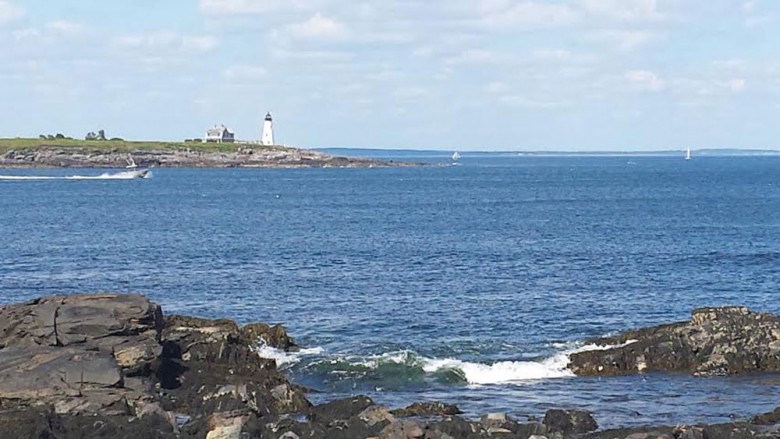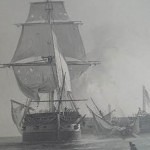Nautical poetry in the Bay State
By Mary McCleary | August 7, 2015, 9:40 EDT
 Photo by Mary McCleary
Photo by Mary McCleary The snow is gone, the chills are past. It’s summertime in New England, with long, breezy days beckoning a quiet respite from work, school, and frenzied activity. When you saunter off to your favorite seaside resort, consider browsing through a book or two of poetry as you twiddle your toes in the sand and gaze away at the maritime vista. In many ways, poems are preferable to novels for beachtime reading since books can be so engrossing that one barely looks up to appreciate the natural surroundings. (Unless, of course, you relish being taken away to another world when you’ve just escaped your own.) Either way, reading a bit of nautical poetry can rouse the imagination and enhance the atmosphere, and few do it better than the Bay State bards.
I’d like to propose a seven course sampling of delectable reading from poets who were born, or spent the better part of their lives, in Massachusetts.
To whet your appetite, here is an amuse-bouche from Oliver Wendell Holmes that commemorates Boston’s own USS Constitution. Perhaps you too can picture the battle-weary ship in this excerpt from “Old Ironsides” (1830):
“Ay, tear her tattered ensign down!
Long has it waved on high,
And many an eye has danced to see
That banner in the sky;
Beneath it rung the battle shout,
And burst the cannon’s roar; —
The meteor of the ocean air
Shall sweep the clouds not more!”
Next is Robert Lowell’s “The Quaker Graveyard in Nantucket” (1946), in which he ponders the death of his cousin who was lost at sea. Elsewhere in the poem, Lowell alludes to Captain Ahab from Melville’s Moby Dick and gives a rather graphic account of whale-hunting. It is filled with references to local spots:
“. . . Sailor, can you hear
The Pequod’s sea wings, beating landward, fall
Headlong and break on our Atlantic wall
Off’Sconset, where the yawning S-boats splash
The bellbuoy, with ballooning spinnakers,
As the entangled, screeching mainsheet clears
The blocks: off Madaket, where lubbers lash . . .”
Now here’s a savory morsel from Emily Dickinson’s “Exultation is the Going” (c. 1859). The poetess compares a soul contemplating the eternal to a land dweller’s elation when heading out to sea:
“Exultation is the going
Of an inland soul to sea —
Past the houses, past the headlands,
Into deep Eternity!
Bred as we, among the mountains,
Can the sailor understand
The divine intoxication
Of the first league out from land?”
Longtime Cambridge resident, Henry Wadsworth Longfellow, wrote many nautical poems. The beginning of his “The Sound of the Sea” (1874) lends a mysterious tone to the quest for the unknown, a theme he explores later in the poem:
“The sea awoke at midnight from its sleep,
And round the pebbly beaches far and wide
I heard the first wave of the rising tide
Rush onward with uninterrupted sweep; . . .”
The fifth excerpt is from Robert Frost, “Neither out Far Nor in Deep” (1936). In the poem, Frost compares the steadfast land to the shifting sea in an analogy of the search for truth.
“The people along the sand
All turn and look one way.
They turn their back on the land.
They look at the sea all day.
As long as it takes to pass
A ship keeps raising its hull;
The wetter ground like glass
Reflects a standing gull.”
The next poetic tidbit is from Sylvia Plath. In “Full Fathom Five” (1958), she alludes to Ariel’s Song in Shakespeare’s The Tempest. In the following excerpt, Plath strives to understand her elusive father:
“Old man, you surface seldom.
Then you come in with the tide’s coming
When seas wash cold, foam —
Capped: white hair, white beard, far-flung,
A dragnet, rising, falling, as waves
Crest and trough. . . .”
And now for dessert. I’ve saved the best for last with Edgar Allan Poe’s “Annabel Lee” (1849). The first stanza seems promising, right? But the story ends tragically. I hope you’ll look it up to see what happens:
“It was many and many a year ago,
In a kingdom by the sea,
That a maiden there lived whom you may know
By the name of Annabel Lee;
And this maiden she lived with no other thought
Than to love and be loved by me.”
So, when you depart on your seaside excursions, remember the local poets and their timeless maritime musings. After all, poetry is not just for a bookish few, but as T.S. Eliot said, “the number of people who can get some pleasure and benefit from some poetry is, I believe, very large.”
Contact Mary McCleary at [email protected]











